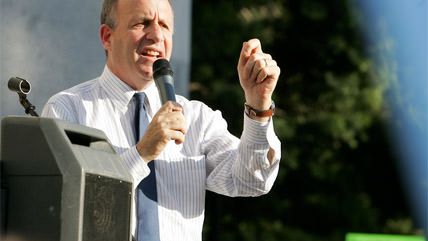Progressives' Latest Plot to Take Power From the People and Give It to Legislators
California Senate passes bill to rein in the voter initiative process

SACRAMENTO — Few things have defined California's politics more than the three election reforms championed by the state's 23rd governor – the initiative, the referendum and the recall. Hiram Johnson's system of direct democracy, used early and often in California since 1911, was designed to place power in the hands of "the people."
That era's "progressives" believed voters needed the power to circumvent legislators, who were beholden to railroad barons and other special interests. Johnson said the reforms "may prevent the misuse of the power temporarily centralized in the legislature" and will help control "weak officials."
Today's legislature is dominated by officials who also call themselves progressives, yet many of them have become increasingly leery of direct democracy. They routinely propose bills to rein in the use of the initiative in particular. One of the most notable reforms, SB 1253, passed the Senate last week on a 29-8 vote, including four GOP "yes" votes.
"This bill makes several changes to the initiative process including providing a 30-day public review process, extending the time frame allowed for circulating a petition, and allowing the withdrawal of a petition at any time before the measure qualifies for the ballot," according to a state Senate bill analysis.
Bill supporters argue that, under existing law, once an initiative is filed there's no opportunity to withdraw it even if drafting flaws are noticed. They say the extra qualification time might reduce the reliance on paid signature-gatherers and that the additional review process will give the legislature a chance to negotiate a solution.
Such tweaks may sound unobjectionable, but this is where Johnson starts rolling over in his grave. Direct democracy is designed to let the people bypass a capitol overly influenced by lobbyists. Recent Senate corruption scandals reinforce the idea that nothing much has changed in a century, even if different special interests exert control there.
Yet SB 1253's obvious stated goal is to bring the legislature more directly into the process and to at least somewhat reduce the role of California voters. "It's good for the citizens when their duly elected representatives can have … a more significant say in making public policy on their behalf," said the bill's sponsor, Senate President Pro Tempore Darrell Steinberg, D-Sacramento. He said constituents often complain about initiatives and wonder why legislators hadn't addressed the matter.
Currently, the legislature holds hearings late in the initiative process, "typically occurring after initiatives have already qualified when there is no opportunity for meaningful policy discussion between proponents and the legislature," argued bill-supporter Kathay Feng, executive director of California Common Cause, in a recent column.
The hearing rules are the most controversial part of the measure.
"This is a dampening of the initiative process that's historical to California," argued Sen. Jim Nielsen, R-Gerber, on the Senate floor. "The only purpose of those hearings is to dampen the gathering of signatures, to campaign against it." Many of the state's most significant initiatives have come about precisely because of inaction by the legislature, he added.
Other conservatives believe this is the first step toward the goal of giving legislators the ability to directly amend proposed initiatives. It's ironic that conservatives, traditionally hostile to direct democracy, are now its main champions. But there's no doubt the Democratic leadership is taking aim at the last main threat to its power.
SB 1253 even gives a broader role to the state attorney general to solicit public comments and amendments to the initiative – even though AGs have routinely been accused of using their current powers to undermine initiatives they don't like by writing titles and summaries filled with politically loaded terms.
Steinberg said the legislature could have gone much further – and that this bill still keeps control in the hands of the initiative supporters. That's true. And most people agree that the initiative process has gotten unduly complex, often is abused by moneyed interests and could stand a little tweaking more than a century after its implementation.
But what would Johnson say about an effort to take even a little bit of the people's power and transfer it to the legislature?
